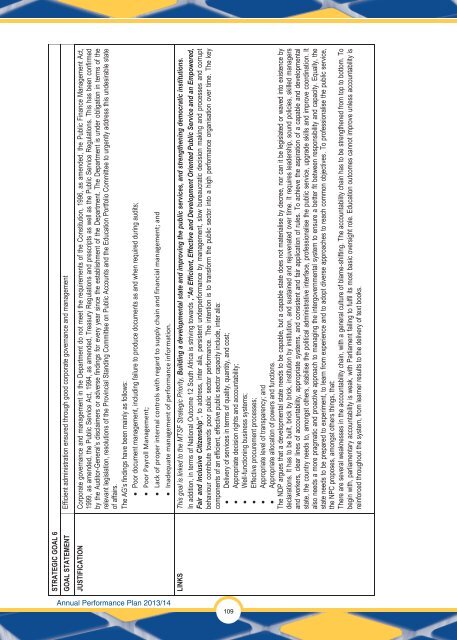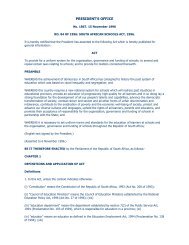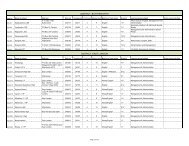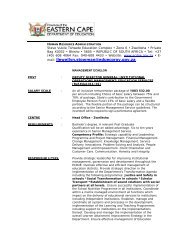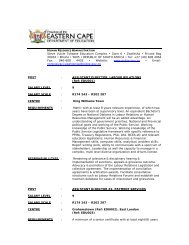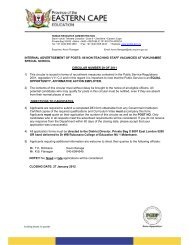Annual Performance Plan 2013/14 - Department of Education
Annual Performance Plan 2013/14 - Department of Education
Annual Performance Plan 2013/14 - Department of Education
You also want an ePaper? Increase the reach of your titles
YUMPU automatically turns print PDFs into web optimized ePapers that Google loves.
<strong>Annual</strong> <strong>Performance</strong> <strong>Plan</strong> <strong>2013</strong>/<strong>14</strong><br />
STRATEGIC GOAL 6<br />
GOAL STATEMENT Efficient administration ensured through good corporate governance and management<br />
JUSTIFICATION Corporate governance and management in the <strong>Department</strong> do not meet the requirements <strong>of</strong> the Constitution, 1996, as amended, the Public Finance Management Act,<br />
1999, as amended, the Public Service Act, 1994, as amended, Treasury Regulations and prescripts as well as the Public Service Regulations. This has been confirmed<br />
by the Auditor-General’s disclaimers or adverse findings for every year since the establishment <strong>of</strong> the <strong>Department</strong>. The <strong>Department</strong> is under obligation in terms <strong>of</strong> the<br />
relevant legislation, resolutions <strong>of</strong> the Provincial Standing Committee on Public Accounts and the <strong>Education</strong> Portfolio Committee to urgently address this undesirable state<br />
<strong>of</strong> affairs.<br />
The AG’s findings have been mainly as follows:<br />
Poor document management, including failure to produce documents as and when required during audits;<br />
Poor Payroll Management;<br />
Lack <strong>of</strong> proper internal controls with regard to supply chain and financial management; and<br />
Inadequate management <strong>of</strong> performance information.<br />
109<br />
LINKS This goal is linked to the MTSF Strategic Priority, Building a developmental state and improving the public services, and strengthening democratic institutions.<br />
In addition, in terms <strong>of</strong> National Outcome 12 South Africa is striving towards ,“An Efficient, Effective and Development Oriented Public Service and an Empowered,<br />
Fair and Inclusive Citizenship”, to address, inter alia, persistent underperformance by management, slow bureaucratic decision making and processes and corrupt<br />
behaviour contribute towards poor public sector performance. The intention is to transform the public sector into a high performance organisation over time. The key<br />
components <strong>of</strong> an efficient, effective public sector capacity include, inter alia:<br />
Delivery <strong>of</strong> services in terms <strong>of</strong> quality, quantity, and cost;<br />
Appropriate decision rights and accountability;<br />
Well-functioning business systems;<br />
Effective procurement processes;<br />
Appropriate level <strong>of</strong> transparency; and<br />
Appropriate allocation <strong>of</strong> powers and functions.<br />
The NDP argues that a developmental state needs to be capable, but a capable state does not materialise by decree, nor can it be legislated or waved into existence by<br />
declarations. It has to be built, brick by brick, institution by institution, and sustained and rejuvenated over time. It requires leadership, sound policies, skilled managers<br />
and workers, clear lines <strong>of</strong> accountability, appropriate systems, and consistent and fair application <strong>of</strong> rules. To achieve the aspiration <strong>of</strong> a capable and developmental<br />
state, the country needs to, amongst others, stabilise the political administrative interface, pr<strong>of</strong>essionalise the public service, upgrade skills and improve coordination. It<br />
also needs a more pragmatic and proactive approach to managing the intergovernmental system to ensure a better fit between responsibility and capacity. Equally, the<br />
state needs to be prepared to experiment, to learn from experience and to adopt diverse approaches to reach common objectives. To pr<strong>of</strong>essionalise the public service,<br />
the NPC proposes, amongst others things, that:<br />
There are several weaknesses in the accountability chain, with a general culture <strong>of</strong> blame-shifting. The accountability chain has to be strengthened from top to bottom. To<br />
begin with, parliamentary accountability is weak, with Parliament failing to fulfil its most basic oversight role. <strong>Education</strong> outcomes cannot improve unless accountability is<br />
reinforced throughout the system, from learner results to the delivery <strong>of</strong> text books.


